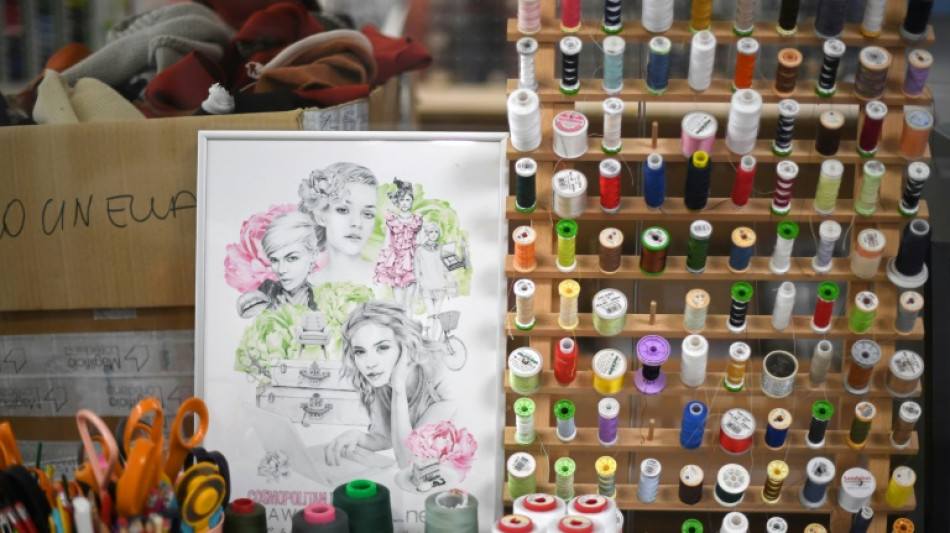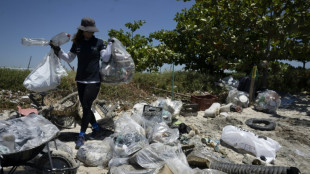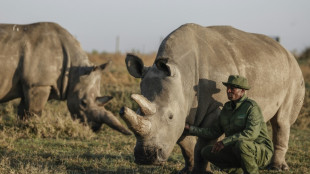
-
 Germany on eve of vote expected to see far-right surge
Germany on eve of vote expected to see far-right surge
-
Spurs revitalised after Ipswich rout: Postecoglou

-
 Milei says welcomes Trump plan for reciprocal tariffs
Milei says welcomes Trump plan for reciprocal tariffs
-
Premier League title out of Arsenal's control, says 'angry' Arteta

-
 Asensio double punishes Jorgensen howler as Villa beat Chelsea
Asensio double punishes Jorgensen howler as Villa beat Chelsea
-
Lille deepen Monaco's woes

-
 Alvarez double takes Atletico top with Valencia win
Alvarez double takes Atletico top with Valencia win
-
Norwegian film 'Dreams', Australia's Rose Byrne win at Berlin

-
 French star Jaminet returns after ban for 'stupid' racism
French star Jaminet returns after ban for 'stupid' racism
-
England edge Scotland in Six Nations thriller

-
 England edge Scotland 16-15 in Six Nations thriller
England edge Scotland 16-15 in Six Nations thriller
-
Israel stalls Palestinians' release after six Gaza hostages freed

-
 Pope suffers respiratory attack, condition critical: Vatican
Pope suffers respiratory attack, condition critical: Vatican
-
French convict freed in murderous ambush is arrested in Romania

-
 Andreeva, 17, makes WTA history with help from LeBron and Federer
Andreeva, 17, makes WTA history with help from LeBron and Federer
-
Nowitzki 'disappointed and sad' for Doncic after trade

-
 Japan's Forever Young wins $20mln Saudi Cup
Japan's Forever Young wins $20mln Saudi Cup
-
One dead, several police wounded in 'Islamist' knife attack in France

-
 Ireland hail supersub energy, Wales see solace in defeat
Ireland hail supersub energy, Wales see solace in defeat
-
One dead, several police officers wounded in 'Islamist' knife attack

-
 Arsenal's Premier League title hopes suffer Hammer blow
Arsenal's Premier League title hopes suffer Hammer blow
-
Rublev outlasts Draper to take second Doha title

-
 Inglis trumps Duckett as Australia defeat England in record chase
Inglis trumps Duckett as Australia defeat England in record chase
-
Israel suspends prisoner release after six Gaza hostages freed: sources

-
 One dead, several police officers wounded in knife attack in France
One dead, several police officers wounded in knife attack in France
-
Thousands join Hungarians judges' rally

-
 Andreeva, 17, becomes youngest WTA 1000 champion
Andreeva, 17, becomes youngest WTA 1000 champion
-
Arsenal title bid rocked by West Ham, Man Utd rescue Everton draw

-
 Prendergast leads Ireland to victory over Wales in Six Nations
Prendergast leads Ireland to victory over Wales in Six Nations
-
France says convict freed in May shootout arrested in Romania

-
 'Soft' Man Utd have to survive this season, says Amorim
'Soft' Man Utd have to survive this season, says Amorim
-
Pakistan coach says 'match-winning' fast bowlers key in India clash

-
 Zelensky 'not ready' to sign minerals deal with US: source
Zelensky 'not ready' to sign minerals deal with US: source
-
Fernandes inspires Man Utd fightback for Everton draw

-
 France's agriculture show, an outlet for angry farmers
France's agriculture show, an outlet for angry farmers
-
Brignone claims Sestriere giant slalom double after Shiffrin flops out

-
 Two in a row for Merlier at UAE Tour
Two in a row for Merlier at UAE Tour
-
Clash with Pakistan just another game, says India batsman Gill

-
 Londoners march in support of Ukraine to mark three years of war
Londoners march in support of Ukraine to mark three years of war
-
Duckett ton drives England to 351-8 against Australia in Champions Trophy

-
 Syrian suspect in Berlin stabbing wanted 'to kill Jews': police
Syrian suspect in Berlin stabbing wanted 'to kill Jews': police
-
Hamas frees 6 Israeli hostages in latest transfer under truce

-
 China's EV maker XPeng eyes doubling global presence by year's end
China's EV maker XPeng eyes doubling global presence by year's end
-
Hamas frees 5 Israeli hostages in latest transfer under truce

-
 Germany on eve of elections under shadow of US-European rift
Germany on eve of elections under shadow of US-European rift
-
Shiffrin flops out of Sestriere giant slalom as Kiwi Robinson leads

-
 Pope begins second week in hospital, cancels Angelus prayer
Pope begins second week in hospital, cancels Angelus prayer
-
US urges backing of 'simple' resolution as Trump calls for Putin-Zelensky talks

-
 Von Allmen leads Swiss 1-2-3 in Crans-Montana downhill
Von Allmen leads Swiss 1-2-3 in Crans-Montana downhill
-
France still seeking to block EU-Mercosur trade deal: Macron


Fast-fashion fallout: young people in UK spurred into sewing
From jogging outfits to summer dresses, Lea Baecker has stitched together most of her wardrobe herself from inside her London flat, part of a burgeoning number of young amateur seamstresses.
Like many others in the growing horde of sew-it-yourself enthusiasts, she has grown increasingly disillusioned with the retail clothing industry, viewing it as too destructive.
"My main motivation was not having to buy ready-to-wear clothes anymore because I didn't want to support fast fashion," Baecker, 29, told AFP, referring to clothes made and sold cheaply to be thrown away after minimal use.
The doctoral student in neuroscience only started sewing in 2018, beginning with small bags before moving on to clothes.
Four years on, she estimates about 80 percent of clothes in her wardrobe are homemade, from pyjamas to long fleece coats, as well as jeans made with denim scraps scalped from relatives.
Baecker now buys new clothes "very rarely", she added, wearing one of her self-made long, hand-sewn dresses.
- 'Scale' -
The fashion and textile industry is the third most polluting sector globally after food and construction, accounting for up to 5 percent of greenhouse gas emissions, according to a 2021 report by the World Economic Forum.
Low-cost fashion retailers are regularly criticised for their waste and pollution, as well as the pay conditions imposed on their workers.
Tara Viggo knows fast fashion only too well, having worked in the industry for 15 years as a pattern maker.
"I realised the scale that the fashion industry was working at and it was a bit terrifying," she told AFP.
In 2017, Viggo decided to start creating her own patterns -- the blueprint drawings on paper before garments are made.
She started out small, selling only around one set of patterns per year, a far cry from the four a day that she would sometimes churn out in the ready-to-wear industry.
Viggo conceded independent operators like her were only tiny competitors to the big brands, but insisted they still could have a meaningful impact.
"The more of us that do (it), the better," she said.
"It's like a trigger... People start to look at where their consumption" is, she added noting it also made you aware of the true costs involved.
"Once you know how to sew your own clothes, you can't fathom that a shirt should be £3 ($4.10, 3.60 euros) anymore."
- 'More young people' -
Viggo's "Zadie" jumpsuit is now a top seller on "The Fold Line", an online platform selling independently produced sewing patterns, according to its co-founder Rachel Walker.
Since its launch in 2015, the website has grown from about 20 designers to more than 150 today.
Rosie Scott and Hannah Silvani, who run a London workshop selling fabrics from fashion designers' unsold stock, have also seen the resurgence in sewing's popularity, particularly among young people.
"The clients have changed," said Scott.
"More young people have shown interest in sewing -- young people who are really interested in making their own clothes and making them sustainably."
Women make up more than 90 percent of the clientele, she also noted.
Customers can choose from some 700 designer fabrics, sold from £8 a metre for cotton voile -- a sheer, lightweight cotton fabric -- to £110 for the same length of lace.
Orders soared during the pandemic and are still going strong despite the lifting of restrictions, Scott said.
- Instagram key -
The sector's explosive growth would not have been possible without Instagram, where the sewing community has made a pastime once seen as unfashionable much more trendy.
The photo-sharing platform "is really important", Baecker said, allowing sewists to post images of their designs and engage with each other.
This is what prompted her to join the social network, where she now regularly shares her latest works.
"I found each pattern has a specific hashtag that you can look up and then you can see a lot of different people wearing the same pattern and you can imagine how it can look on yourself," she explained.
For example, Viggo's #Zadiejumpsuit -- which comes in velvet or cotton, with or without sleeves -- has been tagged in almost 11,000 posts.
Meanwhile, the hashtag #handmadewardrobe features in more than 900,000 posts.
With Baecker sharing so many of her creations, she has also inspired friends to join the growing sewing revolution.
"That is my proudest achievement... getting my friends into sewing as well," she said.
N.Fournier--BTB




